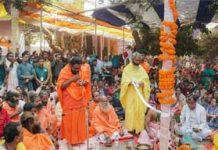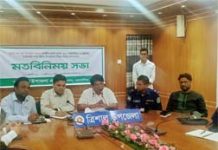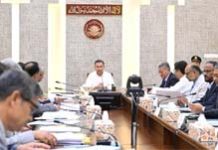C T Online Desk: This is the 10th edition of DLF. How has the festival evolved over the past decade?
The festival has evolved in myriad ways. There is the clear geophysical evolution: starting as a one-day event in a limited capacity at British Council, to the sprawling four-day fare in Dhaka’s intellectual heartland. During the course of the nine editions, we have consciously changed our name to put Dhaka front and centre rather than a narrow-minded post-colonial afterthought. This has evolved both the programming – from bringing to focus a wide range of Bangladeshi literature in the many languages of our country, to bringing in an ever-improving list of foreign guests, lured by the promise of peerless programming – and the audience, which has visibly swelled in numbers, and is more learned and engaged. We have evolved too. When we started, we had idealism and ambition, but scarcely knew how to bring either to fruition. Over the years, we have learned more about how the global literary industry operates and about the logistics of hosting such a festival. A decade in, the Dhaka Lit Fest is a tighter, better-planned, better-run, globally established event. It is one of the top ten literary festivals in the world, which is a direct product of our diligence, dedication and evolution.
What kind of impact do you think the DLF has had on our cultural landscape in this time?
One of the inevitable consequences of hosting a world class literary festival has been seeing an efflorescence of Bangladeshi literature on the global stage, both in the form of original works in English and in translations. Bangladesh has been noticed, and is part of the global literary conversation. While we take great pride in this, what needs to change in our cultural landscape is our mentality. Culture is to be treasured and nurtured. Domestically, we devalue it, expecting it to be free. If our practitioners are not remunerated for their output, culture will forever remain relegated to being a hobby. For it to consistently be of a high standard, it needs to be a profession. We need to rectify this about ourselves post haste or face becoming irrelevant.
What’s different about this year’s DLF?
Let’s address the elephant in the room first: The tenth edition of DLF is a ticketed event. The primary reasons for this are twofold. For one thing, it attaches a greater worth to culture, which we at DLF have been just as guilty as the rest of Bangladesh of failing to do. For another, it allows it to truly be a people’s festival. If the people don’t want to participate, then the festival and its achievements thus far will cease to be. Other than that, this year’s will be a four-day affair. We have come a long way in the last decade. This is the right time to at once celebrate that, and take stock to determine our collective future aspirations. We have never wavered in stellar programming being our first priority. This year is no different. The festival is being headlined by the finest that African literature has to offer – Nobel laureate Abdulrazak Gurnah and Neustadt recipient Nuruddin Farah – because it is our spiritual kin, and Bangladeshis need to pay far more attention to it and give it far greater importance than we have to date. For the first time, we have recipients of those two prizes alongside the most recent Booker and International Booker winners –ShehanKarunatilaka, and Daisy Rockwell and Geetanjali Shree respectively – inthe same place, at the same time. A commitment to climate change discourse that started with our curation of an event with Margaret Atwood during lockdown, is reinforced with Amitav Ghosh’s presence, as is our decade-long commitment to postcolonial discourse, with the return of Pankaj Mishra. Another first is a live performance by a popular Bangladeshi band in the form of Meghdol.
Covid forced you into a three-year hiatus. Did it change your perspective about festivals like the DLF?
Not even a little. Many festivals moved online, to adapt to the new world order enforced on all of us by the pandemic. From the very beginning, we vowed to stay true to our live format. It immediacy and intimacy cannot be replicated. We need to breathe the same air as literary luminaries to have literature imbued in us. Moreover, it would no longer be Dhaka Lit Fest without the geographical location and the unique circumstances that come with it. The world does not need another generic forum of talking-heads.
Where do you see the DLF in five years’ time?
We see DLF becoming the world’s best literary festival in five years’, and one that is made sustainable through the participation of our audiences. Our audiences are all, in effect, stakeholders of the event; we count on their support and that may come through buying tickets, becoming patrons, or simply by giving us good energy.














